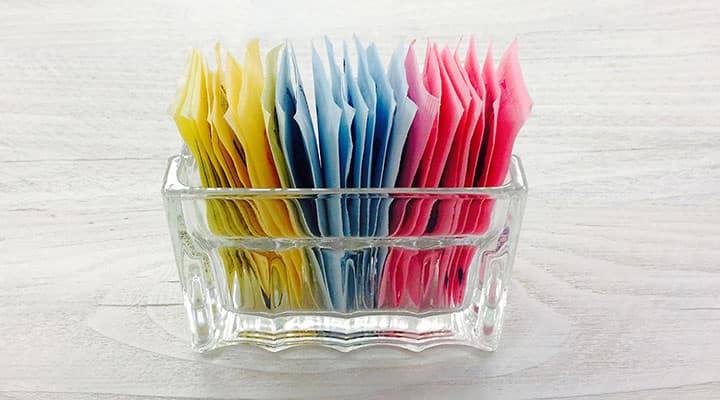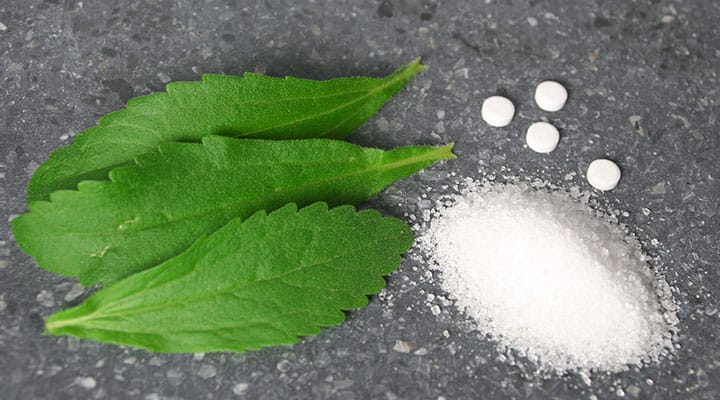
Exploring the Side Effects of Sucralose: What You Need to Know
Exploring the Side Effects of Sucralose: What You Need to Know
The standard American diet typically includes an excess of sugar, and this can lead to obesity, inflammation, and other health problems. To counter this, some people turn to sugar alternatives, like sucralose or aspartame, to save on calories.
However, a new study highlights the potential side effects of swapping real sugar for an artificial sweetener. Research from the Diabetes and Obesity Research Institute of the University of Southern California found that compared with sucrose (table sugar), sucralose, one of the more popular sugar alternatives, may trigger increased hunger signals, potentially increasing appetite and overeating. They also found a reaction in the hypothalamus, which helps regulate the body and other regions of the brain involved in motivation. So the impact of sucralose could be much more complex than some people think.
Ironically, consuming a diet drink made with sucralose, sugar-free coffee creamer, or a packet of Splenda in your iced tea might work against your weight loss goals instead of for them. It may also lead to other undesirable health effects.
Weight Loss Panel (Basic) Blood Test
What problems can sucralose cause?
While research is ongoing, the World Health Organization issued a guideline in 2023 warning about the potential adverse effects from the long term and increased use of artificial sweeteners like sucralose (or Splenda). In fact, the World Health Organization specifically advises against using artificial sweeteners to control body weight.
These guidelines are based on a systematic review that found consuming sugar alternatives, including sucralose, has no long-term benefit on reducing body fat and could even trigger weight gain. Also, in the long term, it could potentially lead to an increased risk of:
- Type 2 diabetes
- Cardiovascular diseases
- Mortality
Important caveat: Most available research on the impact of artificial sweeteners, such as sucralose, on body weight and other markers of health was conducted on animal models, not on humans. More human research is needed to better understand the impact of sucralose on metabolic health.
How does sucralose affect weight and appetite?
Many people think that because they're zero-calorie (or close) and have a low glycemic index, sugar alternatives like sucralose won't spike your blood glucose or insulin and won't contribute to weight gain. And to be clear, sucralose may be an appropriate swap for sucrose in some individuals' diets when trying to lose weight. But science suggests it's not that straightforward.
Here are some factors at play:
Increased hunger
: Data shows that non-sugar sweeteners like sucralose can also be related to a slight increase in body mass index (BMI), possibly because they might stimulate hunger.Gender and weight differences
: Individuals will have varying responses to consuming sucralose and other artificial sweeteners based on factors like gender and weight. Your body undergoes very complex processes when you consume sucralose (or anything, really), involving blood glucose, intestinal health, insulin, and other chemicals. These, in turn, play a role in your metabolic health. Choosing between sucralose and table sugar is about so much more than the calories you're consuming, and what works for one person may not work for the next.Ultra-processed foods
: The source of the artificial sweeteners you're consuming matters when it comes to your health and body weight. For instance, heavily processed foods are more likely to contain sugar alternatives like sucralose as well as other undesirable ingredients that may be correlated to poorer metabolic health and weight gain.
A safe approach is to speak with your healthcare provider to better understand if leaning into artificial sweeteners like sucralose may be a healthy choice for you, based on your health, medical history, and so on. As a general rule of thumb, if you're trying to consume fewer calories and improve your cardiometabolic health, a great idea is to focus on removing added sugars—not replacing them with sucralose, aspartame or other artificial sweeteners.
What does sucralose do to gut health?
Scientists are still trying to answer this question. Some evidence suggests that sucralose and saccharin could impact the gut microbiota—the microorganisms that live in your intestinal tract—especially in animals. But the effects of these sweeteners in humans are not as clear, and more research is needed.
While increased sucralose consumption and longer-term use may alter the gut microbiome, it seems that short-term consumption of sugar substitutes could be safe and may not have the same impact on metabolic and gut health. But remember, effects vary from person to person.
Are there better sweetener alternatives?
Yes! There are natural sugar alternatives, such as stevia, that are better for your metabolic health than sucralose.
If you're going to opt for sweet foods containing sugar substitutes, sugar alcohols are better options than sucralose, although they may cause intestinal upset in some people. Examples include:
- Xylitol
- Erythritol
- Maltitol
In contrast with sucralose, studies show xylitol may actually have a beneficial effect on the oral and gut microbiome. But if you have dogs, be aware: Xylitol is extremely toxic to them!
When reading nutrition labels and comparing sugar substitutes like sucralose and aspartame, it helps to know what exactly counts as "real" sugar versus other sweeteners. For example, agave sugar and coconut sugar aren't all that different from your standard cane sugar, although they may be slightly less processed. But they are still real sugars and not lower-calorie artificial sweeteners like Splenda.
What do health experts say about using sucralose?
Generally, health experts say that sugar substitutes like aspartame and sucralose are safe when consuming them in moderation—so a dash of Splenda here and there shouldn't carry any huge risk.
Long-term sucralose consumption, especially in increased amounts, may become problematic and lead to potential negative health effects, especially if you're consuming highly processed foods and beverages. For instance, some zero-sugar candies are made with sucralose.
How can you consume sugar in a healthy manner?
While you should speak to your healthcare provider for more personalized care and to better understand the potential effects of consuming sugar substitutes like sucralose, there are a few general guidelines that apply to most individuals:
- Focus on consuming mostly whole, unprocessed foods in your diet. This will automatically equate to a decreased intake of sucrose and sugar substitutes from less-than-ideal sweet treats. This approach is better for weight management and your overall health.
- Limit added sugars in your foods and beverages, and try to remove them, not replace them with sugar substitutes. This will support better metabolic health.
- Remember that sweeteners can go by different names. Splenda is sucralose. Sweet'n Low is saccharin.
- If you do want extra sweetness in your diet without the calories, consider alternatives that can better support your health, like sugar alcohols or stevia, rather than sucralose.
Lowering your intake of sucralose doesn't have to mean sacrificing taste. Just use these sugars mindfully! Before you add a scoop of Splenda to your tea or oatmeal, consider a healthier alternative.
References
- Aguayo-Guerrero JA, et al. "Sucralose: From Sweet Success to Metabolic Controversies-Unraveling the Global Health Implications of a Pervasive Non-Caloric Artificial Sweetener." Life (Basel). February 2024. https://pmc.ncbi.nlm.nih.gov/articles/PMC10971371/
- Arumugam B, et al. "Stevia as a Natural Sweetener: A Review." Cardiovasc Hematol Agents Med Chem. 2022. https://pubmed.ncbi.nlm.nih.gov/32031079/
- Azad MB, et al. "Nonnutritive sweeteners and cardiometabolic health: a systematic review and meta-analysis of randomized controlled trials and prospective cohort studies." CMAJ. July 2017. https://pubmed.ncbi.nlm.nih.gov/28716847/
- Chakravartti SP, et al. "Non-caloric sweetener effects on brain appetite regulation in individuals across varying body weights." Nature Metabolism. March 2025. https://www.nature.com/articles/s42255-025-01227-8
- Del Pozo S, et al. "Potential Effects of Sucralose and Saccharin on Gut Microbiota: A Review." Nutrients. April 2022. https://pubmed.ncbi.nlm.nih.gov/35458244/
- Di Palo DM, et al. "Increased Colonic Permeability and Lifestyles as Contributing Factors to Obesity and Liver Steatosis." Nutrients. February 2020. https://pubmed.ncbi.nlm.nih.gov/32098159/
- Méndez-García LA, et al. "Ten-Week Sucralose Consumption Induces Gut Dysbiosis and Altered Glucose and Insulin Levels in Healthy Young Adults." Microorganisms. February 2022. https://pubmed.ncbi.nlm.nih.gov/35208888/
- Salli K, et al. "Xylitol's Health Benefits beyond Dental Health: A Comprehensive Review." Nutrients. August 2019. https://pubmed.ncbi.nlm.nih.gov/31390800/
- Suez J, et al. "Personalized microbiome-driven effects of non-nutritive sweeteners on human glucose tolerance." Cell. September 2022. https://pubmed.ncbi.nlm.nih.gov/35987213/
- Thomson P, et al. "Short-term impact of sucralose consumption on the metabolic response and gut microbiome of healthy adults." Br J Nutr. October 2019. https://pubmed.ncbi.nlm.nih.gov/31258108/
- Wilk K, et al. "The Effect of Artificial Sweeteners Use on Sweet Taste Perception and Weight Loss Efficacy: A Review." Nutrients. March 2022. https://pmc.ncbi.nlm.nih.gov/articles/PMC8954878/
- Yunker A, et al. "Obesity and Sex-Related Associations With Differential Effects of Sucralose vs Sucrose on Appetite and Reward Processing: A Randomized Crossover Trial." JAMA Netw Open. September 2021. https://pubmed.ncbi.nlm.nih.gov/34581796/
- "Aspartame and Other Sweeteners in Food." U.S. Food & Drug Administration. February 2025. https://www.fda.gov/food/food-additives-petitions/aspartame-and-other-sweeteners-food
- "WHO advises not to use non-sugar sweeteners for weight control in newly released guideline." World Health Organization. May 2023. https://www.who.int/news/item/15-05-2023-who-advises-not-to-use-non-sugar-sweeteners-for-weight-control-in-newly-released-guideline
About Our Story Sources
The Life Extension Health News team delivers accurate information about vitamins, nutrition and aging. Our stories rely on multiple, authoritative sources and experts. We keep our content accurate and trustworthy, by submitting it to a medical reviewer.






